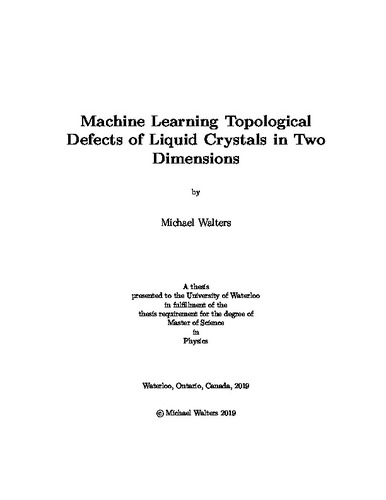| dc.description.abstract | Over the recent few years, condensed matter physics has keenly been testing out the compelling techniques from the toolbox of machine learning. Order parameters, phase transitions, and other thermodynamic quantities have been learned for different systems, including the Ising model and its variants, the XY model, many-fermion systems, and more. In the following work, we apply three different machine learning architectures towards the problem of identification of topological defects, specifically those seen in square-confined, two-dimensional liquid crystals, though the concepts and methods outlined are by no means restricted to this application.
Simulated liquid crystals were modeled by off-lattice, hard, rod-like molecules via Monte Carlo. At high molecular density, geometric frustrations from the square confinement cause the nematic director field to develop an inhomogeneous pattern containing various topological defects as the main physical feature. We show machine learning can capture the correlation between defect positions and the nematic directors around them to classify these different topologies.
With a feed-forward neural network, pre-sorting the off-lattice simulation data in a coarse-grained fashion is necessary for effective learning. We also bring to light the often overlooked reason for why pre-sorting was needed in this case. As a more generalizable approach, we show that a recurrent neural network, via feature correlation, can also learn the topologies without pre-sorting or any other input engineering.
Finally, we investigate how unsupervised learning with principal component analysis can be used to accurately pinpoint the location and the type of winding disclinations in our two-dimensional liquid crystal model. | en |

